
Massachusetts Addiction and Mental Health Treatment Resource Guide
Finding effective addiction and mental health treatment in Massachusetts can feel overwhelming when you or a loved one needs help immediately. This comprehensive guide provides current statistics, verified resources, and treatment options for Massachusetts residents, including how to access professional detox, rehabilitation services, and mental health care when state-funded programs have waiting lists.
Massachusetts is making progress: overdose deaths declined 10% in 2023 to 2,125 deaths¹, with early 2024 data showing continued improvement². However, with fentanyl present in 93% of fatal overdoses³ and only 23.6% of those needing treatment receiving care⁴, professional medical intervention remains critical for safe recovery. 21.6% of Massachusetts residents16 aged 5+ reported behavioral health care visits in the past 12 months, with 9.9% experiencing unmet behavioral health needs16.
Need Professional Treatment Today? The Haven Detox – New England provides immediate access with medical supervision for safer, more comfortable withdrawal management and comprehensive mental health care.
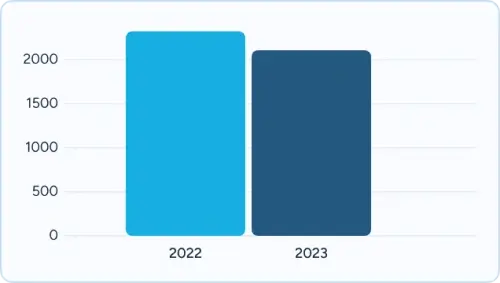
2,125 overdose deaths in 2023¹ (down 10% from 2022’s record 2,357)
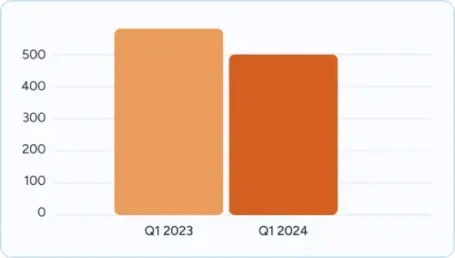
507 deaths in Q1 2024² (continued 9% improvement)
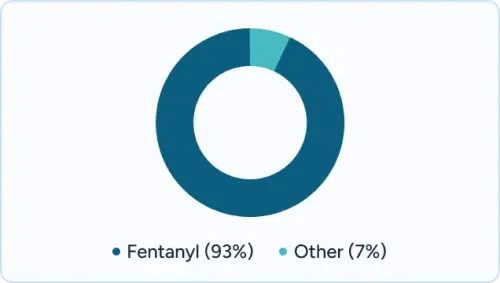
Fentanyl present in 93%³ of fatal opioid overdoses
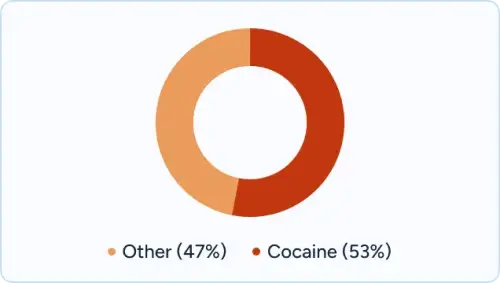
Cocaine involved in 53%³ of overdose deaths
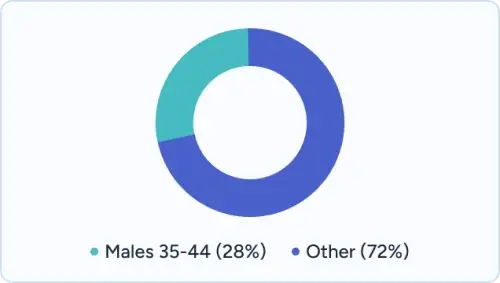
Males aged 35-44¹ represent highest risk (28% of deaths)
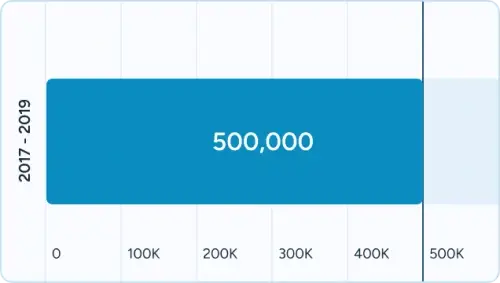
~500,000 Massachusetts residents⁵ had substance use disorder (2017-2019)
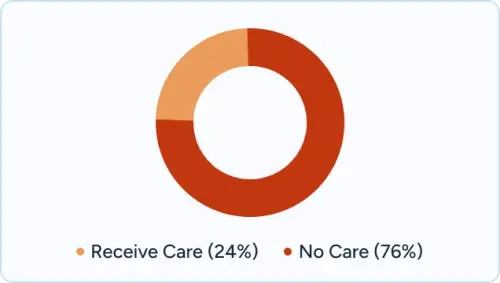
Only 23.6% receive care⁴ nationally
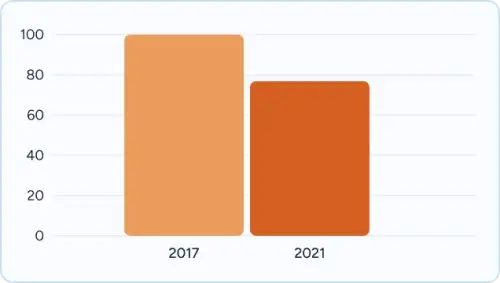
Treatment admissions decreased 22%⁶ from 2017-2021 despite high demand
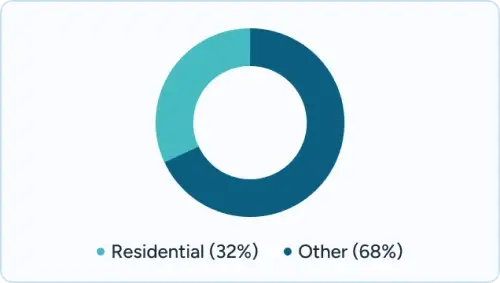
414 total treatment facilities⁷ statewide (133 residential programs)
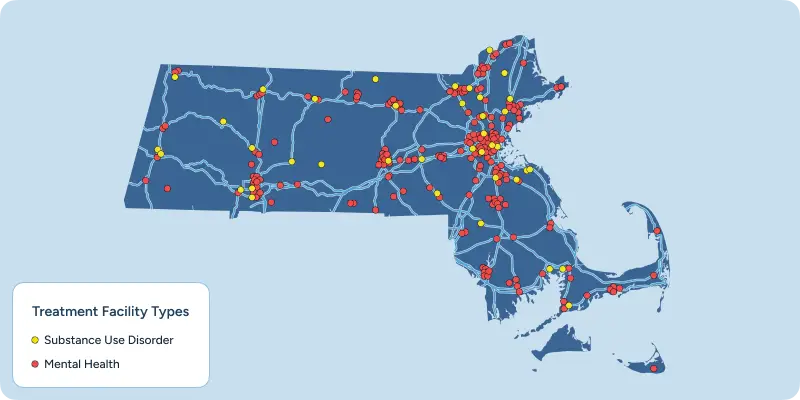
The Bureau of Substance Addiction Services (BSAS) oversees a wide range of programs and facilities across the state. These include more than 39 Peer Recovery Support Centers that provide free services, along with state-licensed detox facilities such as Acute Treatment Services and Clinical Stabilization Services. In addition, BSAS manages 133 residential treatment programs and 281 outpatient treatment facilities, ensuring comprehensive care options for individuals seeking recovery support.
The Massachusetts Department of Mental Health (DMH) operates a comprehensive network of services throughout the state. This includes five geographic area offices that supervise 27 site offices statewide, ensuring oversight and coordination of care. In addition, DMH manages four state continuing care facilities that provide a total of 693 beds for patients requiring long-term support. To further strengthen community access, the department also operates six community mental health centers directly under its administration.
Community Behavioral Health Centers (CBHCs) provide integrated mental health and substance use services across more than 25 locations statewide. These centers operate with extended hours—open from 8 AM to 8 PM on weekdays and from 9 AM to 5 PM on weekends—ensuring accessibility for individuals and families. In addition, CBHCs guarantee round-the-clock support by offering 24/7/365 crisis services, all of which are covered under every MassHealth plan.
MassHealth provides comprehensive coverage that ensures access to essential care for residents across the state. It covers all ASAM levels of care without requiring copayments, a policy that has been in place since July 2020. Currently, MassHealth serves more than 1.7 million Massachusetts residents, extending critical healthcare support to a large portion of the population. In addition, recent legislation in 2024 mandates coverage for recovery coaches, further strengthening support for individuals in recovery. All medically necessary mental health services are also fully covered without copayments, ensuring affordability and accessibility for those in need.
| Admission | |
| Medical Supervision | |
| Withdrawal Support | |
| Dual Diagnosis | |
| Insurance | |
| Waiting Lists | |
| Wait Times | |
| Crisis Availability |
| Admission | |
| Medical Supervision | |
| Withdrawal Support | |
| Dual Diagnosis | |
| Insurance | |
| Waiting Lists | |
| Wait Times | |
| Crisis Availability |
Massachusetts offers a wide range of addiction and mental health treatment services across its major cities. Boston is the state’s central hub, home to large medical centers and specialized programs for people with both mental health and substance use needs. Worcester provides care for central Massachusetts, while Springfield supports the western region. Additional options are available in Cambridge and Lowell.
Many treatment centers report that 30–40% of their patients come from nearby states like Connecticut, Rhode Island, New Hampshire, and Vermont. With major highways (I-95, I-90, I-91) and strong public transportation, Massachusetts is an accessible destination for mental health and addiction care across New England.

Comprehensive addiction treatment offers a wide range of benefits to ensure accessible and effective care. All detox services are covered without copayments, providing essential support at the earliest stage of recovery. Residential treatment is available up to ASAM Level 3.5, while outpatient services include intensive programs tailored to individual needs. Medication-assisted treatment is also provided, with options such as methadone, buprenorphine, and naltrexone to support safe and effective withdrawal management. In addition, recovery coach services are included, with mandated coverage beginning in 2024, ensuring ongoing guidance and support throughout the recovery process.
Comprehensive mental health coverage ensures that individuals have access to essential services without financial barriers. All medically necessary services are provided with no copayments for most programs, making treatment more affordable. Annual behavioral health wellness examinations are also available at no cost-sharing, supporting early detection and ongoing care.
Children under 21 receive additional services through the Early and Periodic Screening, Diagnostic, and Treatment (EPSDT) program, which is designed to meet their unique developmental needs. Furthermore, individuals have the freedom to access any therapist who accepts MassHealth, unless they are enrolled in managed care plans, ensuring broader options for personalized mental health support.
Several major private insurers provide coverage for treatment services in Massachusetts, ensuring broad access to care across the state. Blue Cross Blue Shield is accepted at more than 274 treatment centers, making it one of the most widely recognized insurers. Other leading providers include Harvard Pilgrim Health Care, Tufts Health Plan, and AllWays Health Partners, each contributing to a comprehensive network of insurance options for individuals seeking mental health and addiction treatment services.
In 2024, Governor Healey signed legislation that introduced several important changes to strengthen addiction and mental health care coverage. The new law mandates recovery coach services coverage without cost-sharing, ensuring individuals can access ongoing guidance at no additional expense. It also includes coverage for opioid reversal drugs such as naloxone, expanding access to lifesaving interventions. In addition, the legislation requires coverage for pain management alternatives, offering safer treatment options beyond traditional medications.
Finally, expanded telehealth services have been mandated for both addiction and mental health treatment, improving accessibility and convenience for patients across Massachusetts.
Understanding addiction and mental health treatment benefits in Massachusetts can be complex. Professional treatment centers provide insurance verification and authorization assistance, ensuring you understand your coverage before admission.
Massachusetts residents can find local guidance for addiction recovery, mental health services, and community-based support through The Haven Detox’s city-focused resource guides. Each guide highlights treatment access, recovery programs, and behavioral health resources unique to its region.
When choosing a treatment facility, it is important to remain cautious of places that make unrealistic promises such as offering a “cure” or claiming “100% success rates.” Facilities that lack proper licensing or medical supervision should also raise concern, as should those with poor online reviews regarding safety or the quality of care. Additionally, be wary of centers that discourage family involvement or outside medical opinions, rely on only one treatment approach for all patients, or fail to address co-occurring mental health conditions. These warning signs may indicate substandard or unsafe care practices.
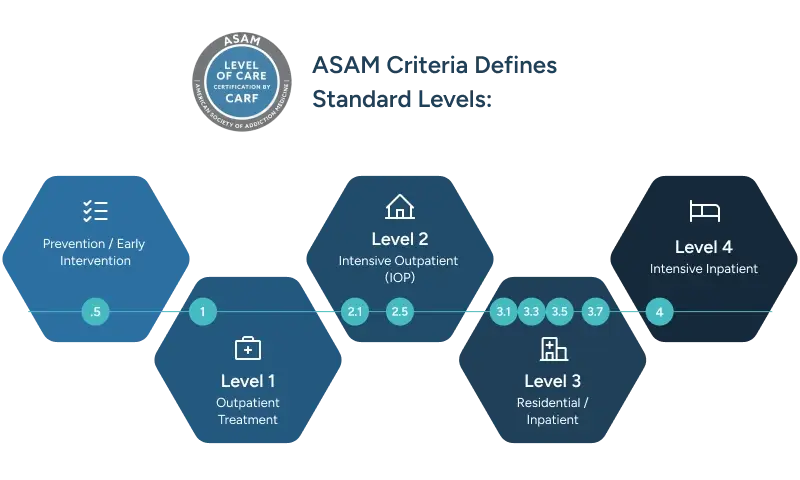
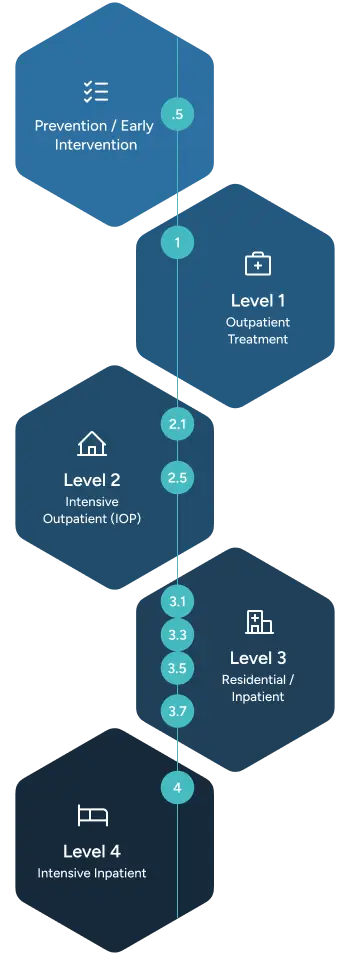
While Massachusetts offers excellent public resources, professional treatment facilities provide distinct advantages when immediate care is needed:
Treatment works when you’re ready. Massachusetts data shows that professional medical detox followed by residential treatment provides the safest foundation for long-term recovery, especially with fentanyl’s presence in 93% of overdoses and the high rates of co-occurring mental health conditions requiring immediate medical intervention.
Verify benefits and understand your treatment options
Compare programs, read reviews, and make informed decisions
If you or a loved one is experiencing a mental health or substance use crisis, help is available right now:
Private facilities often provide same-day admission for both addiction and mental health crises. State-funded programs may have 1-5 week waiting lists depending on location and level of care. Call the facility directly as early as possible to ask about availability.
Yes, MassHealth covers all ASAM official levels of care for addiction treatment⁹ and all medically necessary mental health services16 without copayments. Many private facilities accept MassHealth and provide authorization assistance.
Massachusetts welcomes out-of-state residents for treatment. Many facilities report that a significant percentage of patients come from other states, most commonly surrounding northeastern states. Many insurance plans provide coverage across state lines.
Integrated treatment approaches address both conditions simultaneously using evidence-based therapies, coordinated medication management, and multidisciplinary treatment teams trained in dual diagnosis care.
Section 35¹² allows involuntary commitment for substance use when someone poses serious harm risks. For mental health, Section 12 provides involuntary commitment criteria. However, voluntary treatment typically produces better outcomes.
Relapse is common in recovery from both addiction and mental health conditions. Most professional facilities provide alumni support and readmission assistance. Treatment is not a one-time event but an ongoing process.
Detox typically takes 3-7 days, residential treatment 30-90 days, and continuing care is ongoing. Mental health treatment varies widely based on individual needs and progress.
24/7 Support
No Commitment
100% Private
There’s no catch. Checking your insurance is simply a way to see what your plan covers — it doesn’t lock you into treatment, notify anyone, or cost you anything. You get answers upfront to decide what makes sense for you.
Protecting your privacy matters! No information or notifications are ever sent to your employer or family — whether you check your insurance online or call. Everything is handled through secure, encrypted systems that meet strict medical privacy laws. You stay in control of your information!
Luckily, most insurance policies cover treatment here. Depending on the healthcare you’ve already had this year, costs could even be zero. Instead of worrying, let’s just find out what your plan covers.
Most likely. We work with major providers like Cigna, Aetna, and United Healthcare, public insurances like Tricare and tribal plans, and even smaller plans like Surest Bind and Harvard Pilgrim. The quickest way to know for sure is to check online or call. It’s a quick, private way to understand what is covered upfront.
Verifying your insurance isn’t a commitment to start treatment — it’s simply a way to see what your options are. Knowing your coverage ahead of time helps you make more informed, confident decisions. It also helps flag a spot, so you’re able to get right in if you ever do decide you’re ready.
You need your policy number to check your specific policy online. If you want general information, just call. You likely have questions beyond insurance anyway. Reaching out now helps you figure out the right fit if or when you’re ready. You don’t have to put off the call until you’re in crisis. Calling is not scary, I promise!